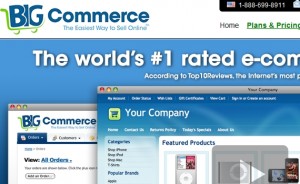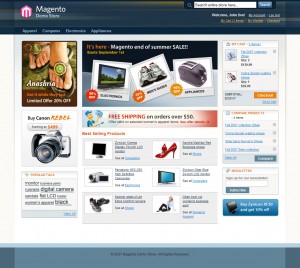If you’re looking to build the ultimate online store, you need the ultimate shopping cart solution. Just one problem: They all claim to be the best. Shopify heralds itself as “the #1 eCommerce solution,” while Magento boasts of being “the most flexible enterprise-class eCommerce platform to power your business,” and BigCommerce strives to create “the world’s leading eCommerce platform.” It’s like walking through Brooklyn. Every ristorante in town claims to have “the best pizza in New York,” but obviously they can’t all be right. Well, it’s time to put the debate to rest. As the founder of one of the nation’s leading SEO, design and development firms, I have worked extensively with BigCommerce, Magento and Shopify, and I have explored every major feature of every major platform. So when it comes to Shopify vs BigCommerce vs Magento, who offers the best service for the best value? Let’s look at them one by one.
BigCommerce hasn’t been around as long as Shopify, but already it has made quite the name for itself. With over 40,000 stores and $2 billion in sales, it may soon become the most successful eCommerce platform in the world. But the question remains: Is it the best? According the BigCommerce website, “We power some of the world’s most successful online stores,” but what sets the company apart from the pack? Let’s take a look at the pros and cons.
The Pros
Ease of Use. If you’re intimidated by the prospect of building an eCommerce website, BigCommerce is—without a doubt—the solution for you. The ease of use is unparalleled, and even if you consider yourself a lost soul in the world of computer technology, you can build your BigCommerce website in the matter of minutes. The point-and-click content management system is so simple that a child can use it, but that doesn’t mean you’ll have to settle for an inferior-quality website. Try it for yourself and see how easy it can be to build a professional eCommerce business from scratch.
Customization. To expand on the first point, let’s assume that you have a highly specific branding vision in mind. You want as many customization options as possible at your disposal, but you don’t want to deal with any complexity in accessing these options. If this hits home for you, go with BigCommerce. BigCommerce has one of the best selections of themes, templates, options and apps, sure to satisfy even the choosiest of business owners.
Search Engine Optimiation (SEO). In the world of online business, SEO is paramount, because it’s not enough to simply build a Web store. You need to rank highly for relevant search queries if you hope to stay afloat. Thankfully, BigCommerce goes above and beyond the basics of SEO with its search-friendly link-structure, custom XML and HTML sitemap configuration, and full customization for title tags, meta descriptions, alt image attributes, blog integration, and marketing features.
The Cons
The Price. Even though BigCommerce doesn’t charge transaction fees (which is a massive advantage), it doesn’t compare with Shopify or Magento in the pricing department. The most cost-effective plan is $29.95, which is good, but not the best. In addition, the top tier plan is nearly $300 per month, which places BigCommerce in the mid-range of affordability. Not ridiculous, but not exactly a superior value.
Customer Support. Perhaps the biggest gripe when it comes to BigCommerce is the customer support. You can reach customer service by phone only between certain hours each day. While the competitors offer 24/7 customer service, BigCommerce still lags behind in this area. So if you have a serious problem after regular business hours, you may lose some business while waiting for help to arrive. This is especially problematic for large businesses.
BIGCOMMERCE TOTAL SCORE: 9/10
Shopify has been around since 2006, and it remains one of the top eCommerce solutions for businesses large and small. The company has powered the likes of General Electric, Amnesty International, CrossFit, Tesla Motors, and even Encyclopaedia Britannica, and it continues to be a dominant force in the eCommerce world. Shopify is hands down one of my favorite shopping cart solutions, in no small part for its ease of use, pricing and versatility, and I consistently recommend it to clients both large and small.
The Pros
The Price. With Shopify, you can get any business going for as little as $24.95 per month, but the real advantage is in the more advanced plans. For about $79 per month, you can enjoy 5 gigabytes of file space and unlimited product listings. This is perfect for most larger online businesses, and you just won’t find a comparable shopping cart plan for this price. Even the best Shopify plan, geared toward the most powerful corporations in the nation, is only $179 per month. That’s downright incredible.
The Themes. Obviously you want your website to look amazing, and with Shopify, you can enjoy some of the most professional-looking themes of any eCommerce platform. What this means is that you can create the kind of website that looks as though it were professionally developed by a team of expert Web designers, even without the added expense of custom development.
The Features. With Shopify, you can accomplish just about anything. In fact, it almost boggles the mind. Set up your website with ease, list products in a matter of minutes, manage your orders, track your sales, list discounts, communicate with customers, achieve high search engine rankings, implement a product rating system…the list goes on and on. You can even implement a custom blog for your business website. It’s downright awe-inspiring.
The Cons
Limited Customization. Okay, so Shopify is pretty amazing, but it’s not perfect. Case in point: customization. You can edit the PHP and HTML, but the process is a bit tricky and inefficient, and unfortunately, there aren’t as many themes to choose from. Now don’t get me wrong. The available themes are fantastic, but there just aren’t as many available. So if you have specific branding needs, you may need to hire a Shopify designer to assist you.
Limited Reporting Options. If you run an eCommerce business, reporting is everything. You want to know who visited your site, where they came from, what they viewed, how many sales you made from month to month, what your top products are, and whether certain products are seasonal in their sales potential, just to name a few of the major factors. Unfortunately, the reporting features for Shopify are still fairly limited, leaving you with a bit of guesswork at the end of the day.
SHOPIFY TOTAL SCORE: 8/10
Magento is a bit trickier to assess. Granted, it’s one of the oldest and most successful eCommerce platforms in the world, but there are multiple versions of the software. The Magento Community Edition is free but lacking in customer support, while Magento Go is geared toward small businesses and Magento Enterprise suits large corporations. It’s like comparing apples to oranges, but this can also be a blessing in a disguise. With Magento, it’s much easier to choose a plan based on your individual needs. You have absolute freedom here.
The Pros
Professional Customization. Okay, so technically, I already listed customization as a winning point for BigCommerce, but let me explain. BigCommerce is great for amateur customization (i.e. selecting themes and features), but Magento is hands down the best when it comes to professional customization. If you’re a developer who likes to tinker with every aspect of your website, go with Magento. Even Magento CE (the free version) allows you untethered control over your website.
Reporting and Inventory Management. If you like to keep very close tabs on your sales, trends and financial accounting, Magento is second to none. The reporting and analytics are a cut above the rest, and you can easily use the comprehensive data to manage or alter your business operations at any given time.
The Cons
Ease of Use. Magento offers some excellent customer support (assuming you’re using Magento Go or Enterprise), but the content management system is a bit more complex than what you’ll find with Shopify or BigCommerce. Take note of this if you prefer your experience to be simple and streamlined. Magento is intended for slightly more advanced Web users.
Discrepancies Between the Different Versions. Unfortunately, the three versions still function as separate software, so if you decide to upgrade from CE to Go, or from Go to Enterprise, you may find yourself with a bit of a mess on your hands. For instance, the plug-ins that are available to CE users are not transferable to Magento Go, and the whole thing can get a bit frustrating.
MAGENTO TOTAL SCORE: 7.5/10
Shopify vs BigCommerce vs Magento – The Winner?
So when it comes to Shopify vs BigCommerce vs Magento, unfortunately there is no clear winner. It quite simply depends on what you demand in an eCommerce provider. If you favor ease of use, go with BigCommerce; if price is your top concern, go with Shopify; if you crave the utmost in customization, choose Magento. Finally, if you need a bit of help building, designing or marketing your website, contact Coalition Technologies. We have partnerships with all three of these leading eCommerce providers, and we can help you to multiply your traffic and sales. Call us for a free quote at 1-888-800-9101. Don’t leave your success to chance.





